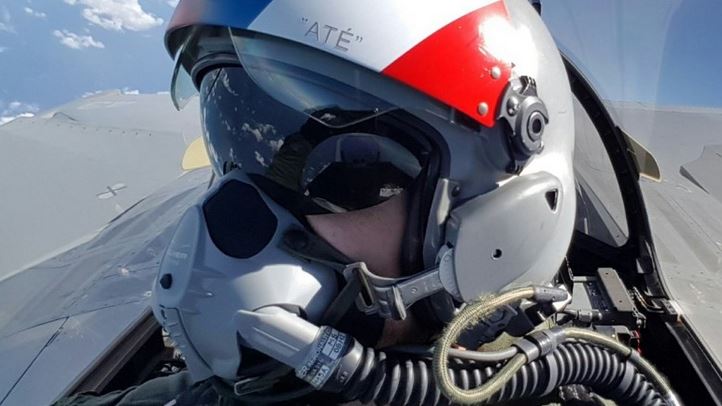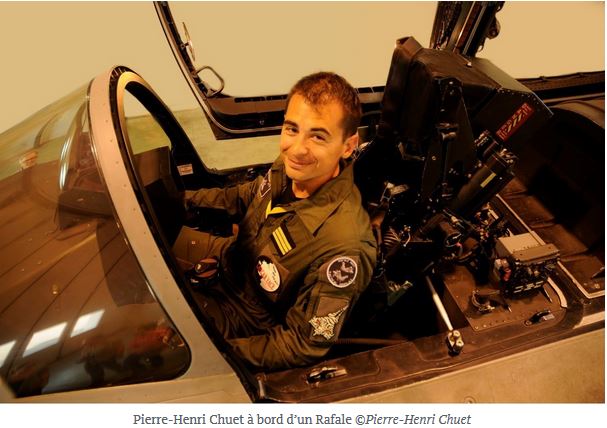
After having flown on Super-Etendard, Falcon 10M and Rafale within the Naval Aviation, Pierre-Henri Chuet is now preparing a reconversion as commercial aircraft pilot. In 2018, the seasoned pilot also embarked on consulting through a commitment within Mach3 Management. As a speaker at the Excellence Club Aerospace conference on February 7, the one his brothers in arms called “Até” gives us a taste of his intervention’s theme by answering our questions.
Question: “Pierre-Henri, the job of a fighter pilot, although popularized, is often overlooked. It is therefore important to ask a key question before addressing future developments in the profession: what is being a fighter pilot today? Real driver or a weapon system manager?”
“A fighter pilot in 2019 is a fine tactician with great discipline and excellent technical handling. This one has a multitude of information: radar, radio, electronic warfare, data link, rules of engagement, allied troops’ position … he will have to sort out and do everything to ensure the mission’s accomplishment. The aeronautical side is still omnipresent, in Naval Aviation the return on board the aircraft carrier is never acquired.
With the performance of a fighter like the Rafale, air combat has also evolved to become less technically tough but more violent physically and dangerously: the human-system interface is so accomplished that it is not because a Rafale is engaged in sight combat he can not shoot an enemy out of sight at the same time!

So we see that despite the technical innovations, the pilot retains a leading role
Question: “What are the main characteristics of the fighter pilot trade that have evolved between the years 2000 and today?”
The workload has moved from the outside of the cockpit, mainly in air-to-air combat or air-to-ground combat, inside the cockpit with sensors’management and sensors used beyond the visual range. Armaments have also adapted and can now be used beyond visual range.
Question: “In the distant future, can the role of the pilot in a fighter plane be questioned?”
To the same extent as the soldier’s. With increasing automation why to send humans to battle when we can send robots? Nevertheless, the judgment, the decision-making and even the anticipatory capacity linked not only to aeronautical knowledge but also to military institutions and chains of command should allow the human to keep a place as close as possible to the action for many more years.
In 2018, France and Germany embarked on a Future Combat Air System (FCAS) project. Do you have any idea of how FCAS engineers will design the pilot’s role in a hostile environment for 2035 and beyond?
The last decade has been the shift from the pilot’s attention to his visual environment or near-medium distance with data link collaborations. The next decades will go even further.
I have never been involved in the SCAF project but I think it will put the pilot as a manager of a multitude of information and quasi-autonomous airborne systems with artificial intelligence-based support. The automations will be even more present, but the pilot will always have the necessary technicality to deliver the fight and pilot the aircraft in a degraded situation. The old diction “Back to Basics” will always apply and good workload management will be paramount.
I have never been involved in the FCAS project but I think it will place the pilot as a manager of multiple information and quasi-autonomous airborne systems with artificial intelligence-based support. The automations will be even more present, but the pilot will always have the necessary technicality to deliver the fight and pilot the aircraft in a degraded situation. The old diction “Back to Basics” will always apply and good workload management will be paramount.
Pierre-Henri CHUET will be one of the speakers at the Excellence Club Aerospace conference on February 7, 2019 at Envol des Pionniers in Toulouse. His intervention, enhanced by the testimonies of a combat-decorated pilot, will be the unique opportunity to discuss the evolution of the combat pilot profession since the end of the 2000s and the way in which technology revolutionizes the battlefield and the training of the operational staff.
Loick Laroche Joubert for AeroMorning




Be the first to comment on "Questions to Pierre-Henri Chuet, fighter pilot within Aéronavale"